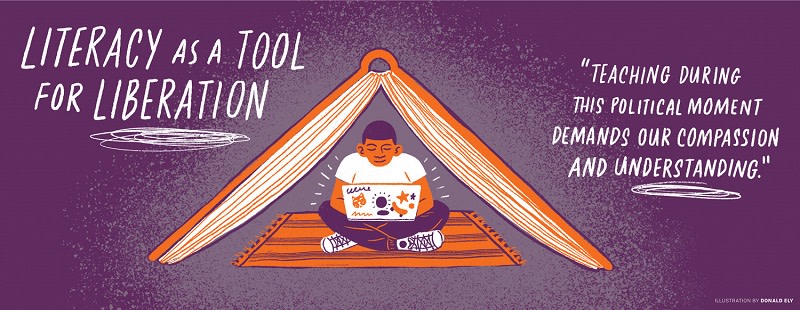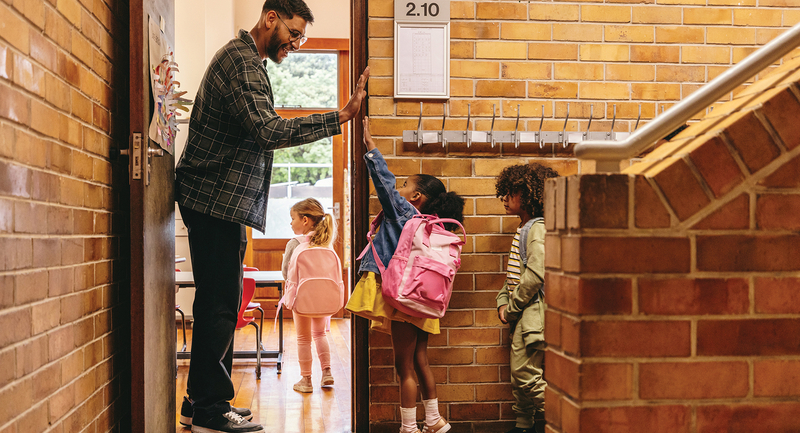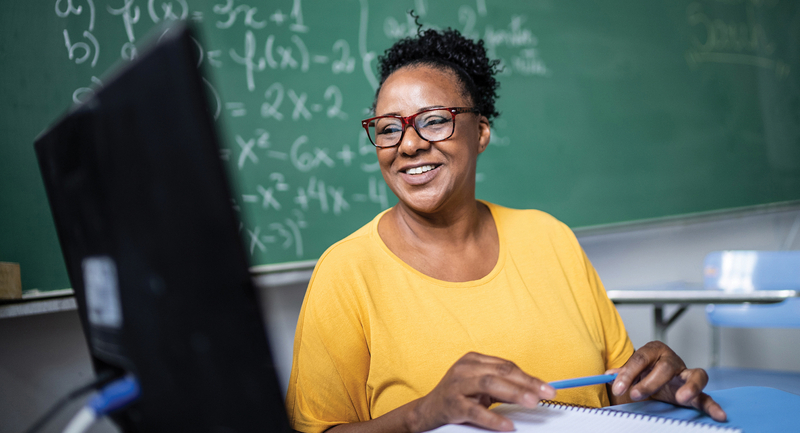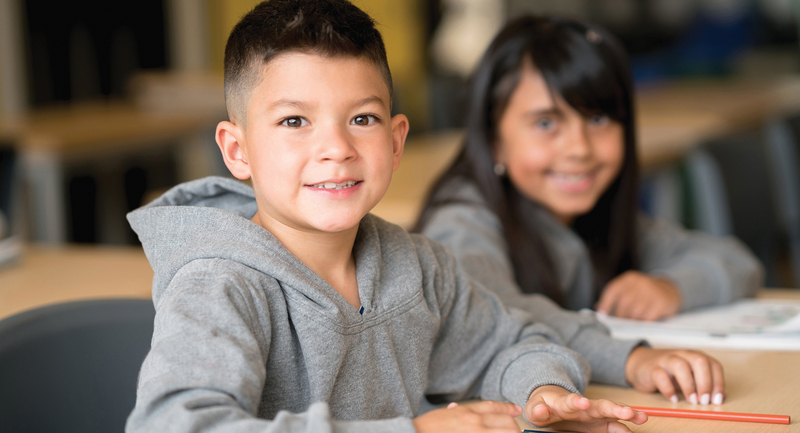October 1, 2020
•
5 min (est.)•
Vol. 62•
No. 10Literacy as a Tool for Liberation
Let's radically imagine and implement new ways of nurturing reading instruction for BIPOC boys.
We are in a particular moment that demands a different response than in times past. COVID-19 and racial reckonings have exposed what many of us who are BIPOC (Black, Indigenous, and People of Color) have known for quite some time: We live in a society that is racist, classist, and does not treat everyone fairly. More specifically, for those of us who are educators, we have had to admit these truths while supporting our students' own burgeoning awareness. These days are, indeed, challenging.
The pursuit of literacy is a pursuit for liberation, especially during a pandemic.
In the 2020–21 school year, it is incumbent upon educators to radically imagine and implement new ways of nurturing the literacy of BIPOC boys while holding onto what we already know is effective: access to texts that provide mirrors, windows, and doors; choice; culturally relevant instruction; and deep work on building relationships with students.
We can turn to James Baldwin (1963) to understand the importance of literacy. As educators and students experience loneliness and isolation, literacy has the power to connect us. Reading, Baldwin argues, helps us face "open wounds in ourselves" and understand others. This moment demands that we use the tools we've long used—books—to respond to BIPOC boys.
The time to focus on centering the needs of BIPOC boys in our practices is long overdue. The past seven months have laid bare our society's inequities. To continue to perpetuate the status quo is educational malpractice. So, what can we do to begin to dismantle the seemingly intractable systems that do not live up to the present-day calling of public education, whether we open doors or video conferences throughout this school year?
Imagine being a BIPOC boy over the past several months and returning to school only to be given expectations like, "You must always use correct grammar in the chat box," or "School uniforms are required when you are sitting in your own living room" (actual examples we've seen online). Much of what educators asked of children as schools reopened was compliance when what they need is compassion.
Children are experiencing the full gamut of emotions right now—fear, depression, anger—while also finding moments of joy, understanding, and power. Educators must create space for BIPOC boys to express their emotions, no matter how they manifest, and see doing so as an act of courage. We must gather all of our resources—counselors, social workers, texts—and prepare a place of restoration for them, while resisting our urge to run away from, rather than lean into, emotional complexity. In other words, BIPOC boys need for us to love them radically, now more than ever before.
"Children are going to be so far behind after spending so much time without formal schooling." Many of us have had this thought, even if we have not articulated it. We want children to be academically successful. Our intentions are good but are often rooted in false assumptions and biases about children and their families and communities.
Early on in the pandemic, Kelly Wickham Hurst, the founder of Being Black at School, wondered if "quarantine homeschooling" was better for BIPOC children. "What if children are receiving lessons and liking them much better because their parents, the ones who love them, are offering it up differently?" she wrote on Medium (Hurst, 2020).
Parents love their children—full stop. Our role as educators is to ask children and families about their literacy experiences over the past months to learn more about each child's unique situation and discover the assets they bring to the classroom community. We must understand the powerful "funds of knowledge" (Moll, Amanti, Neff, & Gonzalez, 2005) that have always been present in households and communities and use our time with children to understand how those funds continue to sustain them.
Before the school year began, Aeriale sent her students a "3rd Grade Reading Life" survey that posed questions about their reading behaviors, interests, and book wishes for the classroom library. One question she asked was, "How's your reading life going at home this summer?" One BIPOC boy responded, "My reading life has been good. I was reading, then thinking and writing about it. I have been reading a lot of chapter books. When I have a word I don't know or [a] question, I stop to answer it. I had enough texts to read."
Aeriale learned in these responses that the student has access to books and is a reader. By framing the questions from an assets-based stance (i.e., calling it a "reading life"), she sets the expectation that the student does, indeed, have one and is curious about how he's fostered it during the summer. She also can use this information to build on his interests and add chapter books to their classroom library. Additionally, this child disrupts the "learning loss" narrative, as he illustrates he has not lost anything.
BIPOC children and families are disproportionately affected by COVID-19. A pandemic, however, should not be an excuse for educators to abandon culturally sustaining practices that help children succeed, and if we are abandoning those expectations, we need to critically examine why that is and change our own beliefs.
Teaching during this political time demands our compassion and understanding. In Guidance on Culturally Responsive-Sustaining Remote Education by the Metropolitan Center for Research on Equity and the Transformation of Schools, the authors point out that students should be "engaged in meaningful experiences and conversations with peers and educators around culturally relevant academic content and materials" (2020, p. 6). Educators can, for example, offer BIPOC boys opportunities to use texts to study the current racial uprisings within the historical context of racial and ethnic sociopolitical movements (see suggestions in next section).
Teachers can also note the ways communities have supported collective action and encourage students to view what's happening now on that continuum of change. Such a unit of study invites intellectual curiosity and empowerment as BIPOC boys learn how their ancestors made their own current reality possible.
Instead, nurture the imaginations and possibilities of BIPOC boys by helping them to dream and create a new future.
In times that feel hopeless, we have texts that can encourage BIPOC boys to continue to reach for broader horizons. We cannot give up on them, and we cannot let our own fears and worries so immobilize us that we transmit that despondence to our children.
Instead, we can draw on stories of adventure, like the cousins in David Bowles' 13th Street series; of humor, like the boys in Lamar Giles' The Last-Last Days of Summer; of fantasy, like Kwame Mbalia's Tristan Strong series and Minh Le's Green Lantern reboot; and of creativity, imagination, and affirmation, like Derrick Barnes and Gordon James' I Am Every Good Thing. (Explore Kim's #Black-BoyLit project on her website for more reading suggestions).
BIPOC communities have a rich history of transcending their circumstances through collective radical imagination and action. Literacy—oral and written—has always been a foundation of our capacity to "freedom dream" (Kelley, 2002). As we move into a new education landscape, we must remember the foundations on which BIPOC boys, families, and communities continue to stand and use literacy as a way to connect them powerfully to educators, schools, and liberation.
On the other side of this pandemic, we should hold out a vision for what kind of literacy educators we want to be and stay true to what we know has always mattered, and what will continue to matter, for BIPOC boys: seeing their literacy strengths, supporting them through struggles, and leaning heavily on re-imagining and creating loving, empowering literacy environments for them to thrive.
References
•
Baldwin, J. (1963, May). Telling Talk from a Negro Writer. Life, 54(21). 81–92.
•
Hurst, K. @mochamomma. (2020, March 23). What if Quarantine Homeschooling is Better For Black Children? Medium. https://medium.com/@kellywickham/what-if-quarantine-homeschooling-is-better-for-black-children-d8706caf5c35.
•
Kelley, R. (2003). Freedom dreams: The Black radical imagination. Penguin Random House.
•
Metropolitan Center for Research on Equity and the Transformation of Schools. (2020). Guidance on culturally responsive-sustaining remote education.
•
Moll, L., Amanti, C., Neff, D., & Gonzalez, N. (1992). Funds of knowledge for teaching: Using a qualitative approach to connect homes and classrooms. Theory Into Practice, 31(2), 132–141.









